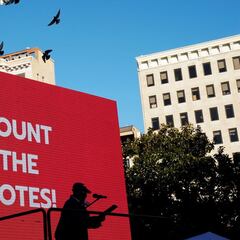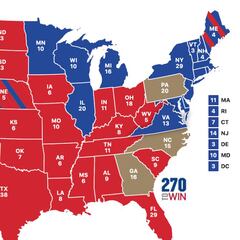Senate US Election 2020 results: what senate races are still undecided?
The race for control of the Senate is going down to the wire, with Democrats hoping to secure the upper chamber of Congress to add to the House of Representatives.


With the race for the presidency of the United States taking up most of the world’s attention, it could be easy for some to forget that there are other crucial elements of the election process being decided. Votes have been cast for senators and for members of the House Representatives that make up the US Congress.
It was confirmed early that the House would remain under Democratic rule, so eyes turned to the Senate. Republicans did hold a 53-47 majority in the upper house and so to turn this around the Democrats would need to gain at least three seats. If Donald Trump remains president they would need four, as VP Mike Pence would have the decisive say in case of a tie.
So, where are we right now? Needless to say, it’s close.
It’s worth noting that terms are different for senators compared to presidents, with them sitting for six years before their seats are up for reelection. That means that every two years around third of the seats are up for grabs, and in 2020, there were 35.
- US Election 2020: live updates
- USA election 2020 results map by state
- How the electoral map changed 2016 to 2020
- Who is Sarah McBride, the first transgender state senator in the US?
Which Senate seats are still open?
As of 2 p.m. ET, both Democrats and Republicans have 48 seats each, leaving four to be decided. To see who is sitting in each state, here is a comprehensive summary.
The four remaining seats are Alaska, North Carolina and two in Georgia. This is how they currently look:
Alaska - 56% of votes reported
Dan Sullivan (Rep): 62.9%
Al Gross (Dem): 31.8%
Georgia - 94% of votes reported
David Perdue (Rep): 50.0%
Jon Osoff (Dem): 47.6%
Georgia (Special Election) - 95% of votes reported
Raphael Warnock (Dem): 32.7%
Kelly Loeffler (Rep): 26.1%
North Carolina - 94% of votes reported
Thorn Tills (Rep): 48.7%
Cal Cunningham (Dem): 46.9%

How Congress forecast has affected the markets
Those who banked on a big US government spending splurge may be dismayed but two days on from US Election Day, investors are looking on the bright side - less regulatory tightening than feared and a central bank still in full money-printing mode.
Global stocks extended their surge on Thursday as Democratic challenger Joe Biden edged closer to snatching the presidency from Donald Trump, and there is little sign of panic about an election outcome that may end up in the courts.
Disappointment over stimulus appears to have been replaced by relief that without a Biden clean sweep of Congress and the White House, gridlock between a Biden administration and a potentially Republican Senate would scupper any plans to tighten the screws on tech and pharma giants.
"Biden being elected increases the chances of a fiscal stimulus deal, but (with a Republican Senate) it also reduces the ability for him to push through significant taxes rise or policies that might constrain the likes of Amazon and Apple," Bell said.
"Tech seems to be thinking that the disruptors, most of which are anti-trust regulations will not be significant and that the Senate will be able to prevent it."
Related stories
Similarly, Didier Saint-Georges, managing director at asset manager Carmignac in Paris, noted the positives for pharma shares.
The election has done little to alter the broadly positive investment backdrop, Saint-Georges said, adding: "Moving from Trump to Biden looks like a revolution but in market terms it may not be that significant."

